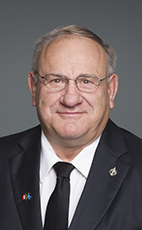Mr. Speaker, the Liberals talk about all the good they are going to do for the people of Canada and how they are saving them money. Could the member tell me what his government is going to do about the fact that in North America, the largest number of vehicles sold in any given year are large, full-size pickup trucks. Small compact cars amount to about 14% of the total vehicles sold in Canada. The rest are large vehicles. Has the member's government taken that into account?
What is his government going to do to try to change the attitude of the people of Canada, or is his government just using its carbon tax as a tax grab?

